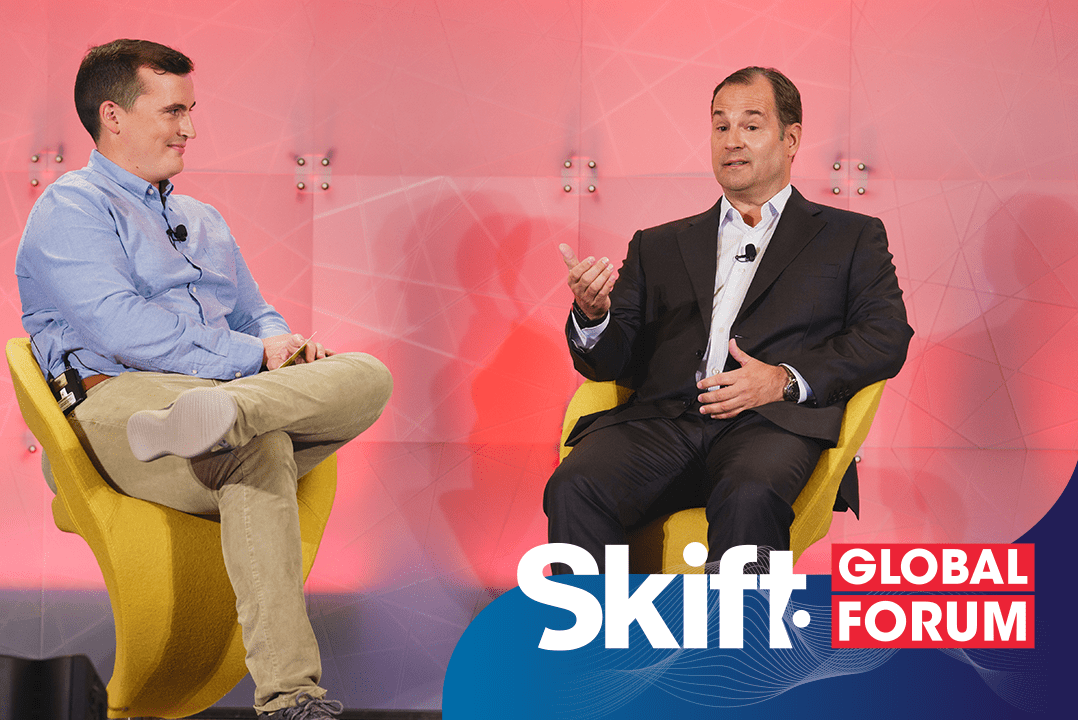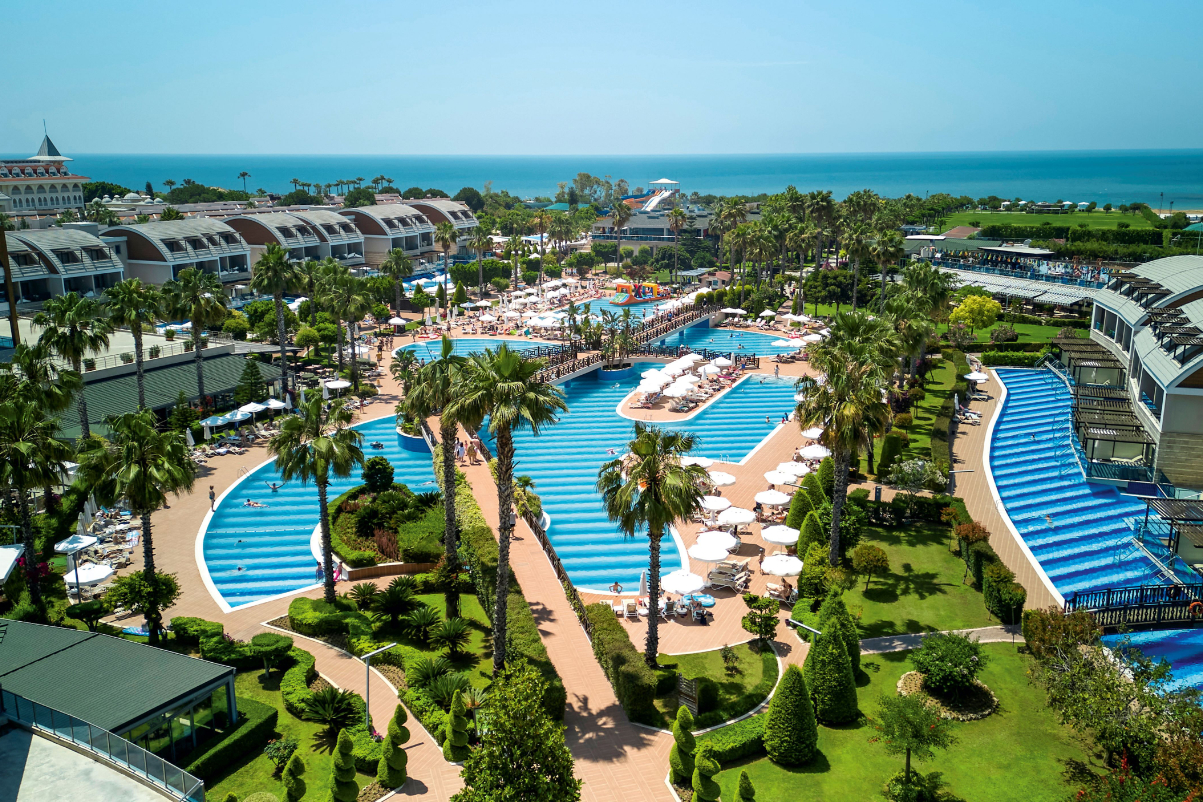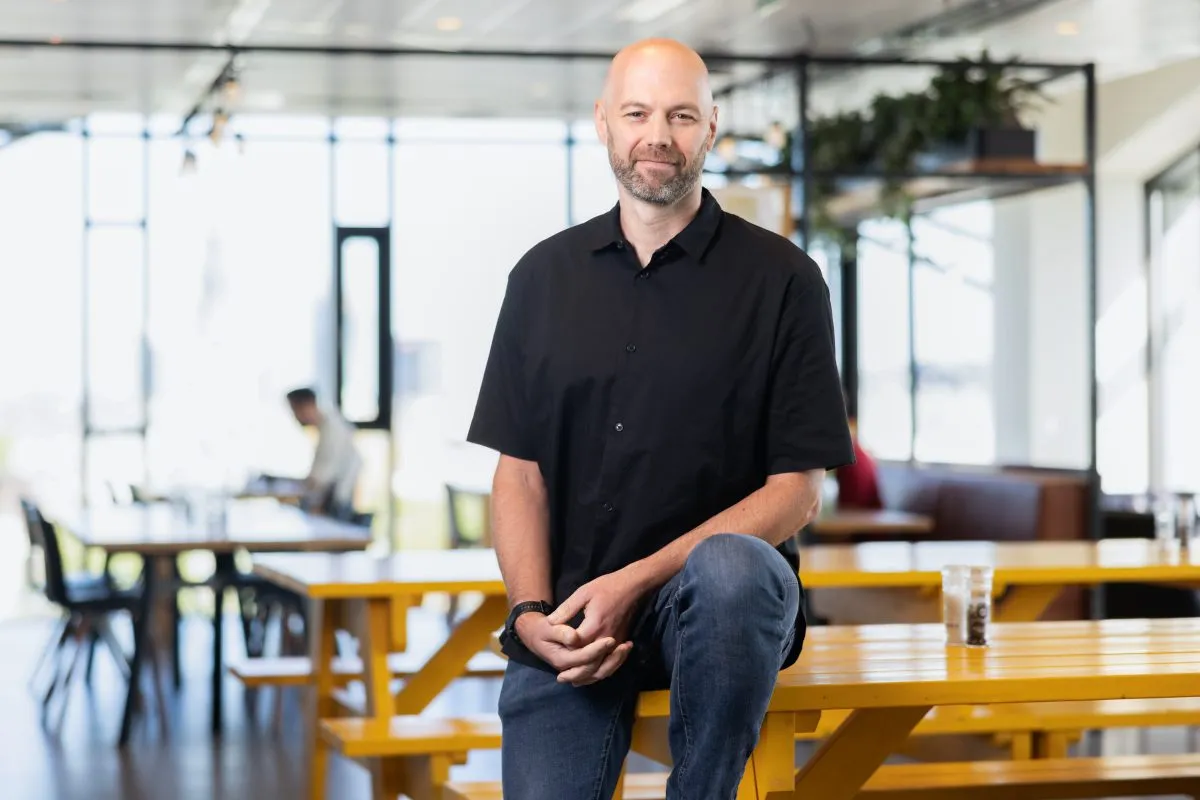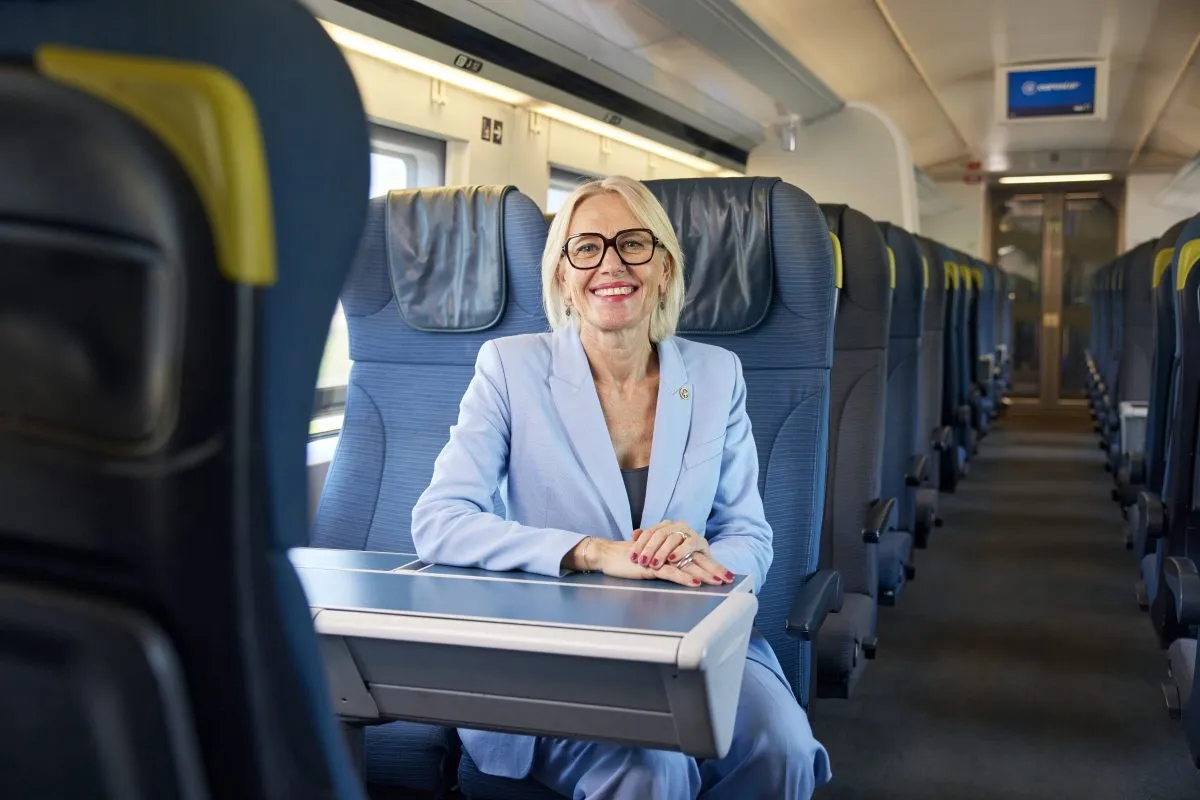Full Video: Marriott CEO Anthony Capuano at Skift Global Forum 2021

Skift Take
Marriott International CEO Anthony Capuano spoke with Skift Hospitality Reporter Cameron Sperance at Skift Global Forum 2021. The two discussed the theme “Charting a Path for Growth Amid Travel’s Uncertain Rebound.”
You can watch a full video of their discussion as well as read a transcript of it, below.
Cameron Sperance: How's it going?
Anthony Capuano: Good.
Sperance: Hi, everyone. Hi, Tony. Thanks for joining us.
Capuano: Thanks for having me.
Sperance: Pleasure to have you here. It's kind of nice to see actual faces in the audience and not just
Capuano: Sure is.
Sperance: Like it's been for the last 18 months.
Capuano: Well, maybe before we start, let me thank Skift. It is so important for our industry to make the commitment to hold in-person events. It's terrific that everybody's here and it's just a great signal we're sending to the traveling public, so...
Sperance: We appreciate that. Thank you.
Capuano: Let me just add one more thank you too. Obviously, it's our collective responsibility to drive and inspire traveler confidence. So I want to thank Tyler (Morse, CEO of MCR Hotels), and the rest of the TWA staff. They've done a terrific job here today, running a well-organized safe meeting. So thanks to the TWA team as well.
Sperance: So shall we dive right in?
Capuano: Sure.
Sperance: We're meeting at a pretty interesting time — Delta variant pushing back the return of the office (workers). Some of us thought it was going to happen sooner than where it's transpiring. You were in the news yesterday quoted as saying "You're seeing conferences, trade shows pushed back a little bit into the end of the year and into next (year)." But we also got some good news this week with the U.S. reopening or announcing plans to reopen international borders to vaccinated travelers. How do you package all of that in your recovery outlook for the rest of the year into next (year)?
Capuano: So let me start with the announcement about the borders. As you and I discussed, I just came back from two weeks traveling through five cities in Europe. The ease of traveler as a U.S. visitor with my passport and my handwritten (Centers for Disease Control) card was terrific. But as I met with our owners, our customers, and our partners across Europe, they were frustrated, but they were more puzzled. Because as I'm sure you know in Europe, they've got a digitized comprehensive health credential called the Green Pass. It was just curious to them that they couldn't cross U.S. borders with this digitized health credential. Yet they trusted that U.S. travelers were not counterfeiting these handwritten cards. So as I met with our customers, I mentioned that I have the good fortune later this week to meet with the Secretary of Commerce. That was going to be one of the topics at the top of our agenda.
I may claim that we already had the meeting, and it was that meeting that led to the change. But its great news for the business. I mean, what was clear, as I was in two cities in Germany, three in Italy, and European travelers are clamoring to get back on the road, just like travelers from around the world. They are anxious to visit the U.S. In terms of the Delta variant, if you look at our data, I suppose one of the great things about our industry (is) we have real-time information because we're looking at the booking patterns on a day-to-day basis. We saw a really strong month-over-month improvement through May, June, (and) July. We saw a little retrenchment in August a few points that I think fairly probably is related either directly or indirectly to the Delta variant. But just through the first two weeks of September, we've seen fairly strong stabilization.
I think China's maybe another good example of this. We saw terrific volumes across all three demand segments in China. Then you saw a few outbreaks. There were about 150 cities in mainland China that were locked down until they got containment. We saw occupancy drop, but then immediately recover. So I think our broad view about recovery remains optimistic. But it won't be like a conventional recession where five years from now, we can look back and see a smooth, steady recovery curve. It'll be much more choppy because of the unpredictability of the virus.
Sperance: Understood. Do you want to shift gears into the theme of our conversation, which is growth? Since July, I believe I have noticed that Marriott leadership has talked about the (mergers and acquisitions) climate for the greater hotel industry, but also Marriott as well. Talking about how a deal like Starwood acquisition is unlikely but smaller one-offs, bolt-on acquisitions for places where you see that there are holes to fill. That might be the future of M&A for you. Marriott's approaching what 8,000 hotels?
Capuano: Mm-hmm.
Sperance: So in a network like that, where do you have holes to fill?
Capuano: Well, fairly the Starwood acquisition dominates the press, and it should given its scale and its impact. But if you look at the five years prior to that acquisition, we had a fairly steady cadence of what we internally termed bolt-on acquisitions. And whether that was Gaylord Hotels, Protea Hotels, Delta, (or) AC. All of those had similar DNA. In some cases, they represented a platform that we thought had regional or even global growth implications. And in some cases, they helped us achieve geographic footprint in a market where candidly, we had struggled mightily to grow organically. So Protea might be the best example of that. Prior to that acquisition, we didn't have a single operating hotel in Sub-Saharan Africa. With the stroke of a $200 million check, we became the largest hotel company on the continent.
I do think that's been a strategy that's worked well for us. One of the benefits of our footprint and our scale, we don't feel any urgency to do an M&A deal to gain scale, but I think we'll look at opportunities as they present themselves. But if we consider doing a deal, it'll likely share the DNA of the transactions we've done before. We may view it as an opportunity to bolster the portfolio and give us a new growth platform. Or we may look at some geography around the world and say, we're dissatisfied with the breadth of our footprint and M&A might be the quickest way to achieve our objectives. I think whether it's us or our competitors, I do think you will likely see an acceleration in deal volume. I think there's a variety of reasons — scale, obviously. But I think the investment required in technology infrastructure and the complexity and investment required for loyalty programs will likely be catalyst for more consolidation.
Sperance: The deal volume, though. I mean, I feel like a lot of people expected like a crashing wave of that months ago. (It) hasn't really happened. You've seen admittedly a couple of big deals announced, but when are we going to see that crashing wave?
Capuano: I don't know that it will be a crash, and I say that for a few reasons. Number one, the lending community and hospitality have been flexible. They've been creative, and they've been pragmatic. So you've not necessarily seen the distress that many had predicted in the early days of the pandemic.
I think secondly, now that we're somewhere along the recovery curve, you've still got a bit of a gap between buyers and sellers. Sellers say, "The recovery is progressing. Why would I sell now? Let me ride the recovery curve a little further." Then you've got buyers that say, "I'd love to do a deal if I can get a deeply discounted price." I think that gap between the bid and the ask has moderated deal flow a little bit.
Sperance: Got it. One other area where I noticed on earnings calls, you'll talk a lot about growth are conversions, soft brands, things like that. Are there parts of the world in your network where that type of growth works best relative to new build in your hard brands?
Capuano: Well, I think it works well everywhere. If you look over a couple decades of Marriott's growth trajectory, it is a bit countercyclical. When the markets start to soften a little bit, we tend to see our conversion volume ramp up. Some of that is because of the realities of the availability of debt for new construction. Some of it is because owners of independent hotels or branded hotels where the owner is not certain that they've optimized their branding strategy. On the precipice of a downturn they say, "Even if it's a risk mitigation factor, I want to align with a stronger set of revenue engines, a stronger loyalty program." There are markets like many of the Asian markets (and) the Middle East markets, where the growth tends to be dominated by new construction. But even in those markets, particularly as you pointed out because of a stack of soft brands that we offer, we are seeing an acceleration in conversion activity.
Sperance: Understood. So along with growth, I feel like with the hotel industry's growth trajectory, sustainability sometimes is put to the side. But we are sharing New York City this week with the UN General Assembly. Climate change is expected to be a big topic. Here you have some sustainability news of your own that you're ready to announce today.
Capuano: We do. We're really excited about it. As you know, we've been on a sustainability journey for years, but we are making an announcement today that I think is a quantum leap forward in terms of our efforts. We've submitted a letter to the science-based target initiative, and we've made two commitments on behalf of the company. We've made a commitment to reduce our emissions and set targets for that across our portfolio and our supply chain. And then maybe more impactfully, we've agreed to set targets to reach a net zero emissions target by no later than 2050. It's something we're enormously proud of (and) we're very passionate (about it). I think it really dovetails well with one of the company's core values, which is to serve our world.
Sperance: Wonderful. It's interesting because … fantastic announcement. (But) there's a lot of pushback when companies do announce net zero pledges because there's not necessarily an overarching regulatory body defining what that means. So, if we're going to track Marriott over the next couple of decades, what is your accountability metric? How are we going to be able to tell that you're inching towards that goal, leaping towards that goal? Hopefully.
Capuano: Well, as part of this announcement, we've aligned with the UN's Race to Zero initiative, and I think they will continue to evolve metrics, which will inform our progress.
Sperance: Great. The other thing too with your planned growth, I was listening to Marriott's Chief Financial Officer Leeny Oberg last week at the JP Morgan conference talking about the push for probably more new build in China. How do you accommodate that new build construction, (which) is obviously pretty energy intensive, with this plan to go net zero?
Capuano: It's a great question. I mean, we've made the announcement, which is the easiest part of this work. Now the real work starts. The good news (is) I think most of the folks in the room know our business model. We're approaching 8,000 hotels. We own less than 20. I'd be happy to sell you any of those 20. But as a result of that model, deep engagement and transparent communication with the owner and franchise community is critical. Just last week, we spent two days with 130 of our most significant franchise partners here in the U.S. and Canada. And I participated in four distinct executive forums with that group. This was the first topic that came up in each of those executive forums.
So we've got a group of partners globally that are passionate not just about talking about sustainability, but evolving our business model in a way that will allow us to achieve these ambitious goals. So to your specific point, as we're talking to our partners about new construction, we're going to be looking at sustainable materials, we're going to be looking at new building methods, we're going to be looking at energy efficiency — all of the elements of new construction to help us move towards that net zero goal.
Sperance: If I'm a hotel owner in your network, when should they start to expect to see expectations that they adhere to this?
Capuano: Well again, the good news is they won't wake up this morning and say, "Oh my goodness, we need to be aware of sustainability." In many ways, one of the wonderful things about this symbiotic relationship we have with our owners (is) they're pushing us. So many of them are actually a bit ahead of us — they are deeply engaged. They want to leverage our resources to learn how they can help accelerate this goal. So it will be like any initiative, very collaborative with those owners.
Sperance: How important is government buy-in to something like this? I know in certain parts of the world, and even in the U.S. there are more incentives to retrofit older (heating, ventilation, and air conditioning) systems, et cetera. So, how are those discussions going and how big of a piece is that?
Capuano: Again, it's early. Support from local governments around the world is obviously of tremendous value. But what we really see, I've been asked repeatedly, "Why now? You're in the midst of recovery from the biggest crisis the company and the industry has ever faced." My answer is two pronged. Number one as human beings, I think it's our responsibility. But when you think about our business model, we answer to four distinct constituents: our associates, our guests, our owners, and our investors. Each of those groups has a rapidly growing urgency around sustainability.
And so government support is terrific. Even if there was no government support, our associates and prospective associates are asking questions. "Do I want to work for this company? Are these companies values aligned with mine?" Our guests — particularly group meeting planners — are asking for our Serve 360 Report, which outlines our progress in areas of (environmental, social and corporate governance), before they make their booking decisions. As I mentioned earlier, our owners are keenly focused in this area. And our institutional investors, similarly, they don't want flowery language about our care for the planet. They want to see demonstrated progress to reach these goals. So I think it's the demands and the passion of those four constituencies that help drive our decision to make these commitments.
Sperance: For those of us who are a little impatient, why 2050? Why can't it be sooner?
Capuano: Well, you're channeling Bill Marriott, who says, "Why not sooner?" I would say to you that my words were deliberate — 2050 at the latest. We will, from today forward, try to reach that lofty goal as quickly as we can. There is so much work to do. We want to make sure we don't disappoint, but we will try to get there as quickly as we can.
Sperance: We'll be here following along in the pages of Skift.
Capuano: I know you will. I imagine a quarterly report card.
Sperance: Of course, if not more. So I did want to bridge that into … I know we touched upon a little bit, brand standards — a hot button issue on a good day and let alone a pandemic. I know a lot of companies like Marriott relaxed them to give owners a bit of a financial life raft. But the expectation is those are coming back in some form or fashion with accountability next year. How are you going to balance that with this? I mean an interview that came to mind is former Starwood CEO Barry Sternlicht was at the Saudi Arabian Hospitality Summit last fall and labeled brand standards as "akin to throwing money in the ocean when it comes to return on investment." And that's one of the more polite things I've heard about brand standards. So how do you win over those people with this...
Capuano: I'll respectfully pass on commenting on that quote. But I think that our customers have a set of expectations. Brand standards are one of the tools we have available as a global brand company with 30 brands to reach our aspiration of meeting those expectations. As we recover from the pandemic, the thing I can tell you … And as I said, we spent a lot of time with our owners last week, there is not a one size fits all approach to when and how we evolve brand standards and return to brand standards. Our expectations for a luxury hotel in the Southeast, where demand is roaring, will likely be very different than our expectations for a select service hotel in a city center location, where the demand curve is much flatter.
The return to accountability was not done in a vacuum. It was done again in consultation with our owners and franchisees who quite interestingly again pushed us. And they said, "We want you to have a little flexibility, but we've got to start those measurements again." Because the great news for our industry is in many of these markets, pricing power has come roaring back. But with the ability to drive rate is heightened expectations from our guests and brand standards are one of the levers we have to ensure we're meeting that value proposition for our guests.
Sperance: When you're having these conversations, what struck me at a hotel conference over the summer is I was asking a couple of people — forgive me, if I asked you this too — what's the brand standard that's getting considered that's keeping you up at night? I just assumed it was going to be housekeeping. But pretty much uniformly, it was breakfast. What's the brand standard topic of conversation that's keeping the Marriott team up at night right now?
Capuano: There's a lot keeping me up. I don't know that it's brand standards. But I will say in these two days I spent with our 130 of our partners, housekeeping was probably the most hotly debated topic. Again, there is not a one-size- fits-all approach. You've got guests at both ends of the spectrum. You've got guests that are still dipping their toe into travel and are quite concerned about having somebody come into their room. We've inspired confidence by the level of cleanliness that we've implemented, but they're nervous about somebody entering.
At the other end of the spectrum, I got an email from a guest the other day. He was a lifetime Titanium. He said, "I love your company. I love your brands. I understand what the pandemic has done to you. And I've got a lot of empathy about building back your services." He said, "I only have one request. At home, my wife only lets me have one towel a week, so please bring back housekeeping. So I can use all my towels like I do every day." So I mean, there's this wide spectrum of guest expectations, and we've got a temper that with quality tier and the realities of demand recovery market-by-market.
Sperance: Got it. I want to go back to one growth question I meant to ask at the top.
Capuano: Sure.
Sperance: Relating to the new build nature of China versus the U.S. to bring up Leeny again. I thought it was interesting that she was saying there's kind of this expectation because lending is so tight in the U.S., you're not going to see as much new build here also given your market share. And there might be a shift to Asia, particularly in China because that lending constraint isn't as much of a thing there. Can you maybe elaborate on how it's still going to be possible there not here?
Capuano: Well, (about) most of the hotels that we have, we've got round numbers — about 400 hotels in China, another 400 in the pipeline behind those. The vast majority are directly or indirectly owned by a state owned enterprise. And so in effect, they are self-financing. So concerns about the availability of a conventional construction debt are less relevant there than they are in some of the Western markets. In the U.S., we are seeing a slow opening of the debt markets. They care deeply about brand. They care deeply about sponsorship and much of it is relationship- related lending. I think those all apply in Europe as well (as and the) Middle East again because of the volume of sovereign fund ownership. The availability of conventional debt is less relevant.
Sperance: Got it. (I) Have you for one last minute.
Capuano: Sure.
Sperance: I did want to touch upon Marriott, such a legacy company. You came into the CEO role this year, following the death of the late Arne Sorenson. Do you mind just closing with some lessons you have picked up from your predecessors and the Marriott family coming into this role at such a crucial time for the industry?
Capuano: Well, I think we'll need more than a minute, but I'll try. Obviously, I've had the privilege of working with Bill Marriott for more than a quarter of century. I think particularly as we face this crisis, his steady hand (and) his deep experience navigating crises have been invaluable for the entirety of the leadership team. I worked closely with Arne for 20 years. It is still difficult for all of us to compartmentalize the emotion about his unexpected passing. But many in this room knew him well. You knew that sort of stoic Nordic way that he approached things. His advice to me would have been, "Wipe those silly tears way and get to work. There's a lot of folks relying on you." That's what the entirety of the team has tried to do. I think maybe the two lessons I learned most clearly from him were that it is critically important to be communicative and transparent in that communication. Many of you saw the video he did for our associates in the early days of the pandemic. And I think that sets a wonderful example for how we should be communicating.
Then I think his ability to listen. You speak to people around the world who may be only had the chance to ever meet Arne once, and they came away thinking they had a real relationship. The reason they did that is he was an extraordinary listener. He engaged. He really listened to what the other person had to say. I think that's the other really valuable lesson I take from my couple decades watching him.
Sperance: Lessons for us all for sure. Tony, thank you so much.
Capuano: My absolute pleasure. Thanks for having me.
Sperance: Thanks so much.





